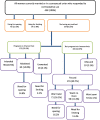Contraceptive use and determinants of unmet need for family planning; a cross sectional survey in the North West Region, Cameroon
- PMID: 30342502
- PMCID: PMC6195995
- DOI: 10.1186/s12905-018-0660-7
Contraceptive use and determinants of unmet need for family planning; a cross sectional survey in the North West Region, Cameroon
Abstract
Background: Reducing unmet need for family planning by increasing the rate of modern contraceptive use is indispensable if Cameroon must meet maternal mortality targets of the Sustainable Development Goals. The objective of this survey was to estimate the rate of contraceptive use and identify factors associated with unmet need for family planning in rural Cameroon.
Methods: It was conducted a community-based cross sectional survey from February to March 2016 targeting women in a union of the Wum Health District. Participants were included by cluster multistep sampling and data collected by trained surveyors using a pretested questionnaire. Data were analysed using Epi-Info version 3.5.4. The odds ratio was used as a measure of association between unmet need for family planning and selected covariates with the statistical significant threshold set at p ≤ 0.05.
Results: Among the 466 women included in the survey, 78.5% were legally married. The mean age of the participants was 28.7 ± 7.2 years with a mean number of years of cohabitation of 9.1 ± 7.4 years. A total of 438 women from the sample were evaluated for contraceptive use and unmet need for family planning. The rate of modern contraceptive use at the time of the survey was 13[10.1-16.6]% and about 5 in every 10 women had an unmet need for family planning (46.6[41.8-51.4]%) with 31.1% having an unmet need for spacing and 15.5% an unmet need for limiting births. The potential demand for contraception was estimated at 45.9% with only 39.8% of this demand met. When controlled for age, monthly revenue, occupation and partner's level of education, discussion of family planning within the couple (OR = 0.66[0.44-0.97], p-value = 0.032), and partner's approval of contraception (OR = 0.66[0.45-0.97], p-value = 0.035), were found to be significantly associated with decreasing unmet need for family planning.
Conclusion: With the very low rates of modern contraceptive use and potential demand for contraception in the Wum Health District, the rate of unmet need for family planning is still very high. Non discussion of family planning within the couple, and disapproval of contraception by the partner are significantly associated with high unmet need for family planning. More of couple-based family planning interventions should be encouraged.
Keywords: Contraceptive use; Determinants; Family planning; Rural Cameroon; Unmet need.
Conflict of interest statement
Authors’ information
Ethics approval and consent to participate
Ethical clearance was obtained from the institutional ethical review board of the Faculty of Medicine and Biomedical Sciences of the University of Yaoundé I (reference number 201/04A). In addition, administrative authorization was obtained from the Wum District Health Service. All participants provided written informed consent. For participants below 18 years of age, consent to participate was obtained from their parents or their legal guardian and an assent signed by the participants.
Consent for publication
Not applicable.
Competing interests
The authors declare that they have no competing interest.
Publisher’s Note
Springer Nature remains neutral with regard to jurisdictional claims in published maps and institutional affiliations.
Figures
References
Publication types
MeSH terms
Substances
LinkOut - more resources
Full Text Sources
Medical
Miscellaneous


